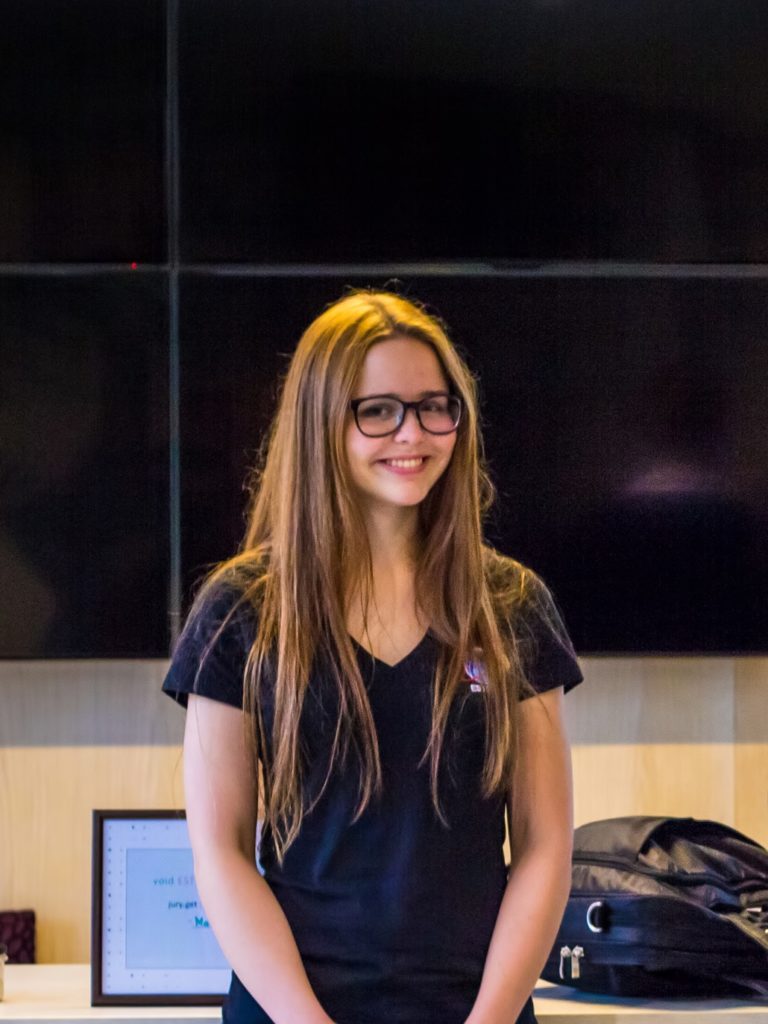
Currently working on her master’s degree in artificial intelligence at the University of Edinburgh, Mari Liis Pedak (24) has loved math since she was little. “To a great extent,” she considers it her father’s doing. “When I was five or six, he would ask me these playful questions with a mathematical undertone. For example, he’d put four marbles on the table and ask, “What do you think, how many different ways are there to line these marbles up?”” (the correct answer is 24). “Here I would like to thank my father for getting me interested in math and encourage people to show their children, especially girls, how beautiful math can be,” says Mari Liis.
“Why is it important to get girls in particular into maths and sciences?” I ask.
“Because society guides boys towards these subjects anyway,” explains Mari Liis matter-of-factly, sipping on tea from a large cup. “I have seen it in schools – the boys were asked first whether they wanted to go to an Olympiad. It was probably not done with bad intentions, they probably just thought that boys would like to go more. But in reality, this sends young girls the message that mathematical sciences are not for them.”
The fact that justice requires constantly pruning any new growths injustice may sprout is something Mari Liis has come to understand over the course of her studies. First, she focused on gravitation waves that confirmed Einstein’s theory of relativity, but then her studies gradually shifted to artificial intelligence and machine learning, which Mari Liis recently used to research the discovered gravitation waves. At one point, the methodology itself started to seem more interesting and perhaps more important than the object of the research. “I am interested in researching how to explain human ethics and values to algorithms. After all, algorithms get more and more power to make all kinds of decisions that steer human fate – from choosing whom to fire, to actually determining the length of incarceration for an inmate, like in the USA! It has also been discovered that in cases with equal infringements and similar criminal backgrounds, this algorithm issues much harsher sentences to black convicts than white ones, which is obviously unacceptable. It looks like the prejudices of many policemen against black people, which we know are there, have also been coded into algorithms and those algorithms are further exacerbating the injustice. Unfortunately, right now artificial intelligence and machine learning are being adopted as the very latest trend that will solve all problems. In reality though, creating a truly just algorithm is very difficult. At the same time, all algorithms or artificial intelligence in general are much more primitive than people might think.” Having spent a year at the University of California Santa Barbara, Mari Liis has another source of concern for the world. “I am seriously worried about climate change, since we have very little time to keep the really serious consequences from happening – for example, mass starvation and hundreds of millions of climate refugees. The levels of greenhouse gases we have in the atmosphere right now haven’t been seen in millions of years. We are moving in a totally unpredictable direction.” So what do we do? “Well, we can’t reverse climate change completely, but what matters now is avoiding catastrophe. Some changes – for example, widespread access to and use of renewable energies – are hard to bring about at the individual level, so this is where governments have to step in. At the same time, everyone can do something, even if it is just driving or flying planes less. Of course, it is also important to eat less meat, because the meat industry emits more greenhouse gases than the transportation sector.” In Edinburgh Mari Liis has tried the pride of local fare – haggis, stuffed sheep stomach, which is apparently close in texture to our blood sausage.
Nevertheless, her love for Scotland is rooted more in the wonderful islands of northwest Scotland or the greenery of Edinburgh, which is perfect for taking long walks. Of course, another reason is the international atmosphere, which has helped Mari Liis, who at one point was on the board of the Edinburgh Estonian Society, start “understanding the world better.” Someday Mari Liis hopes to have the opportunity to help solve one of the Big Problems. “I’m the type of person, who is not frightened by the fact that problems exist – instead, it motivates me to try and solve them!”
5 QUESTIONS
COUNTRY OR CITY: “Can I choose both? I like cities, because there are so many different people and you can learn from others and exchange experiences, however, I also like it in the countryside because it’s beautiful there. Really beautiful.”
DOG OR CAT: “(Quickly) Dog!”
WHITE OR RED: “White”.
TEA OR COFFEE: “Tea, for sure. I am a big tea lover and don’t drink much coffee. I have two favourite teas: a rooibos based masala chai and the smoky black tea lapsang souchong.”
LEFT OR RIGHT: “Politically I probably lean a little to the left.”

